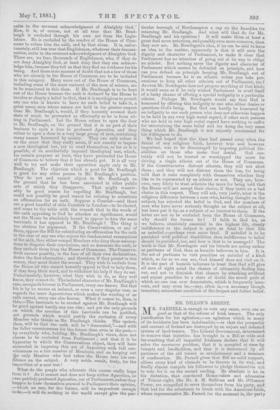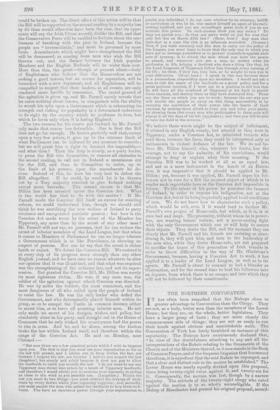MR. DILLON'S ARREST.
MR. PARNELL is enough to ruin any cause, oven one so good as that of the reform of Irish tenure. The only justification for his agitation,—an agitation which in many of its incidents has been indefensible,—is that the prosperity and content of Ireland are destroyed by an unjust and detested system of land-tenure. The Liberal Government, determined. to remove that injustice, has brought in a Bill so wide and far-reaching that all impartial Irishmen declare that it will solve the enormous problem, that it is accepted at once by tenants and landholders, and that it is denounced by all partisans of the old tenure as revolutionary and a measure of confiscation. Mr. Parnell gives that Bill no solid support, allows every kind of obstacle to be thrown in its way, and finally almost compels his followers to pledge themselves not to vote for it on the second reading. So absolute is he in his dictation, that convinced Home-rulers and advocates of Tenant-right, like Mr. A. M. Sullivan and Mr. O'Connor Power, are compelled to sever themselves from his arty, and that but for the reluctance to break with the American-Irish, whose representative Mr. Parnell for the moment is, the party
would be broken up. The direct effect of this action will be that the Bill will be supported on the second reading by a majority less by 25 than would otherwise have been the case, that its oppo- nents will say the Irish Ultras secretly dislike the Bill, and that the Conservative Peers will be enabled to declaim about the use- lessness of breaking with the past in Ireland, because the people are " irreconeilable," and must be governed by mere fordo. Amendments which might have strengthened the Bill will be denounced, as coming from men who wish the Bill thrown out, and the fissure between the Irish popular Members and the English Radicals will be wider than ever. More than this, the great—though at present silent—body of Englishmen who believe that the Home-rulers are not seeking a good tenure, but an excuse for separation, will be furnished with a new argument, and all Englishmen will bo compelled to suspect that their leaders, at all events, are only rendered more hostile by concession. The moral ground of the agitation is given up, and Mr. Parnell openly reveals that he cares nothing about tenure, in comparison with the ability to wreak his spite upon a Government which is exhausting its strength and risking its popularity in a determined endeavour to do right by the country which he professes to love, but which he loves only when it is hating England. The two excuses for his course put forward by Mr. Parnell only make that course less defensible. One is that the Bill does not go far enough. He knows perfectly well that, except upon a very few points, it goes up to the extreme limit of what Parliament can be induced by any pressure to concede ; but we will grant him a right to demand the impossible,— and what then ? Then his duty is clearly, as a party leader, to press the Bill into Committee, to remove all obstacles to the second reading, to call out in Ireland a unanimous cry for the Bill, and then in Committee to insist, up to the limit of his powers, upon the amendments he de- sires. Instead of this, he does his very best to defeat the Bill altogether. If he could, he would let it be thrown out by a Tory majority resolved to give Ireland nothing except more barracks. The second excuse is that Mr. Dillon has been arrested under the Coercion Act. What in the world has that to do with the matter ? If Mr. Parnell made the Coercion Bill itself an excuse for resisting reform, we could understand him, though we should still think he was sacrificing the true welfare of Ireland to party virulence and unregulated patriotic passion ; but how is the
Coercion Act made worse by the arrest of the Member for Tipperary, any more than by the arrest of any other man ? Mr. Parnell will not say, we presume, that he can endure the arrest of inferior members of the Land League, but that when it comes to Members of Parliament he can no longer tolerate a Government which is so like Providence, in showing no respect of persons. Nor can he say that the arrest is either harsh or unjust. We detest the Coercion Bill. We resisted it at every step of its progress more strongly than any other English journal, and we have seen no reason whatever to alter our opinion that it was ill-advised, and that what was required was the strengthening of the ordinary law, and not its super- session. But granted the Coercion Bill, Mr. Dillon was surely its most righteous victim. He was, if any man was, the soldier of the agitation against which Coercion was directed. He was by miles the boldest, the most consistent, and the most dangerous of all who called upon the people of Ireland to resist the law. He was the only leader who defied the Government, and who determinedly placed himself within its grasp, so as to compel the Castle in common decency either to arrest him, or to leave off arresting inferior men. lie not only made no secret of his designs, wishes, and policy, but absolutely alone in his party, said straight out in the House of Commons that he only wished his countrymen had the power to rise in arms. And he, and he alone, among the leaders broke the law within Ireland itself, and therefore within the ;range of the Coercion Act. He said on Monday, near ,Clonmel :— " But now there are a few practical points which I wish to impress upon you. The first is that you must use your organisation as far as the law will permit, and I advise you to keep within the law, not because I respect the law, not because I believe you respect the law (laughter), but simply and solely because it does not pay to allow the landlords to catch you outside the law. I do not want to see any Tipperary man thrust into prison by a bench of Tipperary landlords, and therefore I would advise you to exercise your ingenuity in sailing as close to the wind as you possibly can. (Laughter.) Within the law you must do two things—you must obstruct the levying of rack- rents by every device which your ingenuity suggests ; and, secondly, you must punish the man who assists the landlords to levy their reek- rents. You have an enormous power through your organisation to punish any individual, I. do not care whether ho be attorney, bailiff, or auctioneer, or who he be, who makes himself an agent of the rack- renting landlord, and you are exceedingly great fools if you do not exercise this power. Do rack-renters show you any mercy ? Do they not punish you ; do they not serve writs on you for rent that only fell duo on March 25th last ? (Heer, hear.) Any man that does that in a year like this is an infamous scoundrel. (Groans.) Now, if you want earnestly and like mon to carry out the policy of the Longue, you must learn to know that the only way in which you have got to revenge yourselves or to protect yourselves against such acts of tyranny, is to attack the men whom you have the power to attack, and wherever you see a man, no matter what his profession in life, helping a landlord who does a thing like that, lot the Land Leaguers of Tipperary follow him through every turning of his life ; let them, if they can, ruin him, as he sought to ruin you in your difficulties. (Hear, hear.) I speak in this way because there is a tremendous responsility upon my shoulders. I would not ask a man to risk the anger of tho landlords on a groat policy and for a groat national interest, if I wore not in a position to tell him that he will have all the manhood of Tipperary at his back to punish those enemies, and destroy thorn as they have destroyed him. These are the lines on which you are to work ; because the one way you will enable the people to carry ou this thing successfully is by carrying the conviction of their power into the hearts of their enemies, by making them afraid to evict you and seize your goods, by showing them that every man who participates in these acts will repent it all the days of his life (applause) ; and then you will be able to take the field in the autumn," We believe those words might be the subject of indictment, if uttered in any English county, but uttered as they were in Tipperary, under a Coercion Act, to infuriated tenants who read them between the lines, they could be interpreted only as incitements to violent defiance of the law. We do not be- lieve Mr. Dillon himself, who, whatever his faults, has the courage, not to say the audacity, of his convictions, would attempt to deny or explain away their meaning. If the Coercion Bill was to be worked at all as an equal law, and not as a mere instrument in the hands of an Execu- tive, it was imperative that it should be applied. to Mr. Dillon ; yet, because it was applied, Mr. Parnell urges his fol- lowers not to vote for a Bill the avowed object of which is to render such regrettable laws as the Coercion Act impossible in future. To the extent of his power ho punishes the farmers of Ireland, in order to express his indignation, not at the Coercion Act, but at its being impartially applied to all conditions of mon. We do not know how to characterise such a policy, which would be evil, even if it would tend to further Mr. Parnell's own project of Home-rule, but which, as it is, is at once bad and inept. The peasantry, without whom he is power- less, are wanting tenure reform, not a never-ending fight with the only Government which can or will help to secure their objects. They desire the Bill, and the moment they see clearly that Mr. Parnell and his friends are resisting or aban- doning it, they will quit him, and turn to the leadership of the men who, while they desire Home-rule, are not prepared. to sacrifice the hopes of this generation of Irish tenants in order to throw difficulties in the way of Mr. Gladstone's Government, because, having a Coercion Act to work, it has applied it to a leader of the Land League, as well as to its agents. Mr. Parnell is about to commit as bad a blunder as Obstruction, and for the second time to lead his followers into an impasse, from which there is no escape, and into which they will not be followed by their constituents.



































 Previous page
Previous page